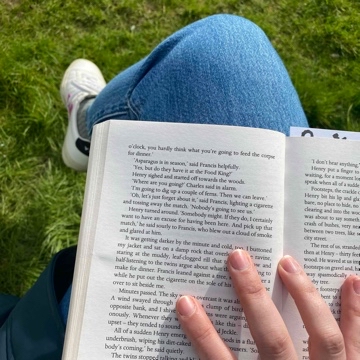Less (Winner of the Pulitzer Prize): A Novel (The Arthur Less Books, 1)
Jetzt kaufen
Durch das Verwenden dieser Links unterstützt du READO. Wir erhalten eine Vermittlungsprovision, ohne dass dir zusätzliche Kosten entstehen.
Beschreibung
Beiträge
Hat 4 Jahre gedauert das zu beenden. Hat mir am Anfang total viel gegeben, mich aber irgendwann verloren. Würde es dennoch weiterempfehlen
will someone kill me if I say this was very similar to 'Eat Pray Love' but also very different? I quite liked the story but not the character as much, he reminded me of me, and how annoying I can be xD
*very short review* This was touching and beautiful and sad and funny. All wrapped in one. I loved the structure, the plot, the metafiction, the satire, the characters. I'm still not sure it warrants a Pulitzer, but what do I know, really? It's a wonderful novel about love, loss, and the literary world.
one of the most heartwarming, at the same time deeply reflective and humorous books I’ve ever read. light but so well written! worth it’s hype.
„Less“ von Andrew Sean Geer hat 2018 den Pulitzer-Preis gewonnen, eine Auszeichnung, der ich ehrlich gesagt wenig Beachtung schenken. Über dieses Buch bin ich eher zufällig im lokalen Buchhandel gestolpert und der Klappentext klang recht interessant. Anfangs fiel es mir schwer, einen Einstieg in die Geschichte zu finden. Arthur Less ist fast 50, ein Mann und homosexuell Ich bin etwas über 40, eine Frau und hetero. Viele Gemeinsamkeiten gab es zwischen mir und dem Protagonisten nicht. Dennoch ist mir Arthur im Laufe seiner Erlebnisse ans Herz gewachsen. Er ist ein sehr freundlicher, zurückhaltender und bescheidener Mensch, der allen anderen den Vortritt im Rampenlicht lässt und sich eher als Anhängsel bedeutsamer Leute sieht, jemand, der nur in Verbindung mit anderen Personen wahrgenommen wird, nie als er selbst. Less hat außerdem, so sieht er es zumindest, kein Glück in der Liebe und als sein letzter Partner ihn für einen anderen verlässt, flieht er vor einer unangenehmen Situation, vor der Liebe und vor seinen Gefühlen. Doch wo immer er auf dem Erdball auch ist – seine Vergangenheit holt ihn überall ein, zwingt ihn dazu, sich mit seinem Innenleben auseinanderzusetzen und seine Leben aus anderen Blickwinkeln zu sehen. Alles dreht sich in diesem Buch im Kreis: Vergangenheit und Gegenwart holen sich ein, Alter und Jugend, Verlassen- und Gefundenwerden. Es ist eine sehr melancholische, aber liebevolle Erzählung mit einem sympathischen Charakter, dem zugegebenermaßen die Ecken und Kanten fehlen, aber er ist einfach ein bisschen „weniger“ als andere. Eine nette, unaufgeregte Story für ein paar ruhige Lesestunden.
This book is exactly what I've been wanting for years now. It made me feel the way so far only queer YA stories could, but without the subtle undertone that I'm a bit too old for them, that they're not quite written for me. I'm obviously not a 50 year old man, either, but Less is written in a way that made me, at least, connect with the main character almost immediately. With his 50th birthday approaching, an invitation to the wedding of his ex-lover (and never-quite-bofyfriend), and his writing career failing, Arthur Less goes for the most relatable solution you can think of: he decides to literally run away from his problems by accepting every invitation the world of literature offers him. All of his stops around the world seem to turn out just like the rest of his life so far, which means everthing is always less than perfect. But every location, be it Mexico, Italy, Germany, France, Morocco, India, or Japan, adds something not only to Less' perspective on life but also to your own, as do the many interesting side characters; even the ones we only get to see a glimpse of. Still, the story could have gone in all kinds of directions, and even with the narrator becoming more and more obvious as the story moves on I wasn't so sure how it would end - at all, and I really appreciate that. At one point I actually thought something had gone wrong about 100 pages ago and the main character had been dead ever since and his journey (to himself) was taking place in the afterlife, and I still think that actually would have been plausible. Anyways, in an age of dark and gritty storytelling and worlds, I especially appreciate the overall message: "Just for the record: happiness is not bullshit."
I am not sure what I think about this book. I enjoyed reading it enough that I got to the end, but the first like two-thirds are just this sad gay dude being sad? It was hard for me to understand what his charm was beyond his unique sexual proficiencies, and I didn't really get why Freddy came back to him. I was also fucking annoyed that no one told him at any point about what happened. I liked it, for sure, and it gets better toward the end, or at least more understandable, but I don't really get why Ann Pachett recommends it with her whole heart.
Was für ein Roman. Die ganze erste Hälfte lang hatte ich schwere Zweifel, ob mich das Schicksal des Akteurs eigentlich tatsächlich genug interessiert, um ein ganzes Buch über ihn zu lesen. Irgendwo in Marokko mit Arthur Less war der Punkt erreicht, an dem ich das Buch nicht mehr weglegen konnte und am Ende musste ich weinen. Sneaky! It‘s all about love... Und die Sprache ist das beste Englisch, das ich seit einer ganzen Weile gelesen habe.
Deprimierend, langatmig, komische Erzählweise aber mit Happy end at last
Beschreibung
Beiträge
Hat 4 Jahre gedauert das zu beenden. Hat mir am Anfang total viel gegeben, mich aber irgendwann verloren. Würde es dennoch weiterempfehlen
will someone kill me if I say this was very similar to 'Eat Pray Love' but also very different? I quite liked the story but not the character as much, he reminded me of me, and how annoying I can be xD
*very short review* This was touching and beautiful and sad and funny. All wrapped in one. I loved the structure, the plot, the metafiction, the satire, the characters. I'm still not sure it warrants a Pulitzer, but what do I know, really? It's a wonderful novel about love, loss, and the literary world.
one of the most heartwarming, at the same time deeply reflective and humorous books I’ve ever read. light but so well written! worth it’s hype.
„Less“ von Andrew Sean Geer hat 2018 den Pulitzer-Preis gewonnen, eine Auszeichnung, der ich ehrlich gesagt wenig Beachtung schenken. Über dieses Buch bin ich eher zufällig im lokalen Buchhandel gestolpert und der Klappentext klang recht interessant. Anfangs fiel es mir schwer, einen Einstieg in die Geschichte zu finden. Arthur Less ist fast 50, ein Mann und homosexuell Ich bin etwas über 40, eine Frau und hetero. Viele Gemeinsamkeiten gab es zwischen mir und dem Protagonisten nicht. Dennoch ist mir Arthur im Laufe seiner Erlebnisse ans Herz gewachsen. Er ist ein sehr freundlicher, zurückhaltender und bescheidener Mensch, der allen anderen den Vortritt im Rampenlicht lässt und sich eher als Anhängsel bedeutsamer Leute sieht, jemand, der nur in Verbindung mit anderen Personen wahrgenommen wird, nie als er selbst. Less hat außerdem, so sieht er es zumindest, kein Glück in der Liebe und als sein letzter Partner ihn für einen anderen verlässt, flieht er vor einer unangenehmen Situation, vor der Liebe und vor seinen Gefühlen. Doch wo immer er auf dem Erdball auch ist – seine Vergangenheit holt ihn überall ein, zwingt ihn dazu, sich mit seinem Innenleben auseinanderzusetzen und seine Leben aus anderen Blickwinkeln zu sehen. Alles dreht sich in diesem Buch im Kreis: Vergangenheit und Gegenwart holen sich ein, Alter und Jugend, Verlassen- und Gefundenwerden. Es ist eine sehr melancholische, aber liebevolle Erzählung mit einem sympathischen Charakter, dem zugegebenermaßen die Ecken und Kanten fehlen, aber er ist einfach ein bisschen „weniger“ als andere. Eine nette, unaufgeregte Story für ein paar ruhige Lesestunden.
This book is exactly what I've been wanting for years now. It made me feel the way so far only queer YA stories could, but without the subtle undertone that I'm a bit too old for them, that they're not quite written for me. I'm obviously not a 50 year old man, either, but Less is written in a way that made me, at least, connect with the main character almost immediately. With his 50th birthday approaching, an invitation to the wedding of his ex-lover (and never-quite-bofyfriend), and his writing career failing, Arthur Less goes for the most relatable solution you can think of: he decides to literally run away from his problems by accepting every invitation the world of literature offers him. All of his stops around the world seem to turn out just like the rest of his life so far, which means everthing is always less than perfect. But every location, be it Mexico, Italy, Germany, France, Morocco, India, or Japan, adds something not only to Less' perspective on life but also to your own, as do the many interesting side characters; even the ones we only get to see a glimpse of. Still, the story could have gone in all kinds of directions, and even with the narrator becoming more and more obvious as the story moves on I wasn't so sure how it would end - at all, and I really appreciate that. At one point I actually thought something had gone wrong about 100 pages ago and the main character had been dead ever since and his journey (to himself) was taking place in the afterlife, and I still think that actually would have been plausible. Anyways, in an age of dark and gritty storytelling and worlds, I especially appreciate the overall message: "Just for the record: happiness is not bullshit."
I am not sure what I think about this book. I enjoyed reading it enough that I got to the end, but the first like two-thirds are just this sad gay dude being sad? It was hard for me to understand what his charm was beyond his unique sexual proficiencies, and I didn't really get why Freddy came back to him. I was also fucking annoyed that no one told him at any point about what happened. I liked it, for sure, and it gets better toward the end, or at least more understandable, but I don't really get why Ann Pachett recommends it with her whole heart.
Was für ein Roman. Die ganze erste Hälfte lang hatte ich schwere Zweifel, ob mich das Schicksal des Akteurs eigentlich tatsächlich genug interessiert, um ein ganzes Buch über ihn zu lesen. Irgendwo in Marokko mit Arthur Less war der Punkt erreicht, an dem ich das Buch nicht mehr weglegen konnte und am Ende musste ich weinen. Sneaky! It‘s all about love... Und die Sprache ist das beste Englisch, das ich seit einer ganzen Weile gelesen habe.
Deprimierend, langatmig, komische Erzählweise aber mit Happy end at last












